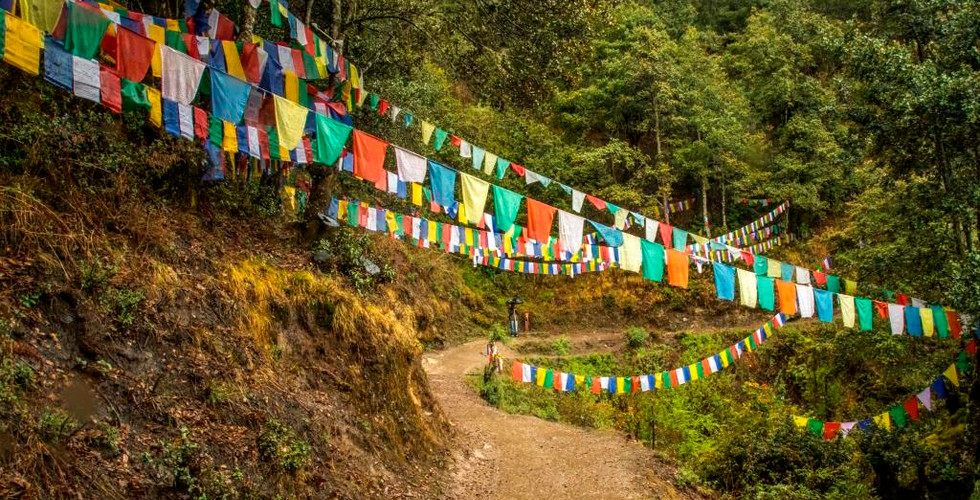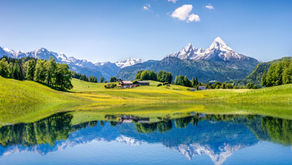Paro Taktsang (Tiger's nest monastery) – A complete travel guide - The Bhutan Odyssey
- Fairytale Studios
- Jul 20, 2019
- 10 min read
Updated: Oct 28, 2020
Taktsang Monastery or Paro Taktsang, popularly known as Tiger’s Nest Monastery is located in the outskirts of Paro district in Western Bhutan. Paro Taktsang is basically a cluster of temples clinging to the edge of an impossibly steep and rocky cliff, seeming to hang in space some 800 metres above the valley. The monastery is located at an altitude of 3120 metres above sea level. Paro Taktsang is the most sacred Buddhist site in Bhutan. For a traveller, if there is one place you ought to visit in Bhutan, it is Taktsang Monastery. In this blog, we will highlight everything that you need to know about the monastery from its history to the hike to the points to remember before visit. So, read on.

If you missed out on our previous blogs of the series - 'The Bhutan Odyssey', read them by clicking on the links or the photos below:
6. Paro Taktsang (Tiger's nest monastery) – A complete travel guide (This article)
How to reach Paro Taktsang (Tiger's nest monastery):
The base of Paro Taktsang, from where the hike starts, is located approximately 12 kilometres away from Paro town. You can hire a taxi to reach Paro Taktsang base. It will take you around 30-40 minutes in a car/ taxi to reach the starting point of trail to Taktsang from lower Paro town. You should ideally reach Paro the day before and start your hike in the morning around at 8 AM.
Best time to visit Paro Taktsang (Tiger's nest monastery):
The best time to visit Paro Taktsang is between the months of March to May and again from September to mid-November. You will get clear skies and the weather remains at its best during these months. From March to May, you will also be able to see the trail leading to Paro Taktsang come alive with most beautiful blossoms especially Rhododendrons. Though we visited Taktsang in early May, a cyclone in bay of bengal resulted in a cloudy and rainy weather. This made the hike slippery and slushy but it also resulted in some mystical landscapes as you would notice.

History related to Paro Taktsang (Tiger's nest monastery):
It is said that a female disciple of Guru Padmasambhava transformed herself into a tigress and carried him on her back from Eastern Bhutan to the site of Paro Taktsang in the 8th century; hence the name Tiger’s Nest Monastery. Guru Padmasambhava assumed a wrathful form, Guru Dorji Drolo, and subdued the evil spirits in the temple’s locality. The tigress also resided in a cave at the temple site and owing to its fearful form helped to ward off evil spirits. At Tiger’s Nest, Guru Padmasambhava unveiled certain treasures for the benefit of sentient beings. He meditated at the Paro Taktsang for 3 years, 3 months, 3 days and 3 hours and emerged in the eight incarnated forms. You can still see the cave where Guru Padmasambhava meditated in 747 AD. Hence, the monastery is also sometimes referred to as ‘Temple of Guru with Eight Names’.
In the 16th century, a small temple was built at Paro Taktsang site by a Buddhist master. In the 17th century, the temple site was offered to ‘The Beard Man’, who is credited as the founder of Bhutanese nation (Read our 1st article in the series - Introduction to Bhutan to get better perspective). The Beard Man instructed Gyalse Tenzin Rabgye, the civil ruler of Bhutan, to build a big temple of 8 manifestations of Guru Padmasambhava. Gyalse Tenzin Rabgye was successful in completing the construction of Paro Taktsang or Taktsang monastery by 1694.

In 1998, Paro Taktsang was destroyed in a fire, the cause of which remains a mystery. All the precious religious images and relics were charred to cinders, and centuries of art, history and tradition were consumed swiftly by the flames. It was then painstakingly rebuilt over 7 years, exactly as it was, with almost every Bhutanese citizen contributing to its reconstruction, in cash or in kind. The charred remains of the precious old images were interred in new images that were made. It was a very special day when the new Paro Taktsang was consecrated on 24 Mar 2005, a symbol of Bhutanese resilience and faith. Surprisingly, the ceremony was conducted by a little boy who is believed to be the young reincarnation of the Gyalse Tenzin Rabgye – the one who had originally built the monastery three centuries earlier.

Hike to Paro Taktsang (Tiger's nest monastery):
It will take you about 2-3 hours of a strenuous hike on the rocky and muddy terrain to reach the Paro Taktsang if you are fit enough. Rains or crowd might slow you down to 4 hours. The trail starts with a walk through a small open flea market where locals sell imitation jewellery, showpieces and Bhutanese artefacts. You can rent a trekking stick from here. The path that leads to the Paro Taktsang is steep and narrow and the hike is mostly along the cliffside. The total distance that you will cover in the hike is about 3 kilometres one way with a gain of 700 metres in elevation. You can opt to hire a pony from the base if you are unable to climb such distance or if you have dodgy knees or ankles. However note that a pony will take you up only till a point.
We started the hike early in the morning with our guide Dorji from The Nature Tourism – Bhutan after buying tickets to enter the Paro Taktsang from the base/ parking lot.

The entire hike to Paro Taktsang is dotted by colourful prayer flags, bright red coloured rhododendron trees and pine trees clinging aside the cliffs. Some of these trees even had boards calling out their age. We were surprised to know some trees were more than a century old. Every twist and turn in the trail offers you a view of different landscape which is as beautiful as the other. Seating benches are installed at a few picturesque points on the path that comes as a welcome break if at all you need it! The entire trail up the Paro Taktsang is also littered with shortcuts, which you should only opt if you are an experienced trekker. While we huffed and puffed and took frequent breaks while ascending, the Bhutanese locals seemed to float up the slope with great ease.


Till midway, you will hike on an unpaved muddy and rocky uphill path till a flat area. The ponies will take you only till this flat area point and you will have to hike yourself after this. A huge prayer wheel is installed in this area. Smaller prayer wheels are lined up on one side that rotates continuously with the strong wind. Various colourful Buddhist flags that are tied everywhere haphazardly flutter with the wind.

From here, the trail branches off, one on left goes to the Paro Taktsang and the one on right through the gate shown in photograph below goes to a cafeteria. The cafeteria serves tea / coffee along with biscuits which costs Nu 120 or so. They also serve lunch buffet at Nu 500 per person. They have a free to use toilet which is clean enough. One can also catch a good view of Taktsang monastery from here if it is not foggy or cloudy.
From here the path becomes steeper and after another 30 minutes. You would see more and more colourful Buddhist prayer flags as you keep ascending. You would also find couple of benches if you would like to rest.
The path flattens down to the viewpoint. All the awesome photographs that you have seen of the Paro Taktsang perched on a cliffside are taken from this spot. The hill on which the monastery stands seems to be of copper colour and often referred to as copper coloured mountain. From this point onwards, you will continue to have amazing views of the Taktsang monastery as well as the valley.

From the viewpoint, you will descend 700 cemented stairs to a waterfall. Yes, there is a waterfall that tumbles down from a 60-metre-high ravine right between two mountains and will spray cold water on you. You will be able to view another small monastery beside the waterfall, several feet above, stuck in between a rocky plateau. This one’s is called as ‘Temple of Urgyan Tsemo’. You will cross a bridge over the waterfall and will have to ascend another 200 stairs to reach Paro Taktsang.
The Paro Taktsang from outside:
You can enter Paro Taktsang only and only if you have bought the entrance tickets from the base/ parking lot. Entrance tickets are not sold at the top or anywhere mid-way. You will have to deposit all your belongings including backpack, camera, mobile phone, walking sticks and eatables in a locker facility at the entrance of the Taktsang Monastery. Photography is not allowed inside the Taktsang monastery just like it is not allowed inside any other monastery in Bhutan. Even sleeveless or half sleeves clothes or shorts and half-pants are not allowed in the monastery. Make sure that you are dressed appropriately with both your arms and legs covered and your head uncovered at all times when inside the monastery. Like most prominent buildings in Bhutan, Paro Taktsang has white exteriors with red or gold roofs.

The Paro Taktsang from inside:
The Taktsang monastery building consists of four temples, eight caves and several residential quarters for monks. The monument is very thoughtfully designed keeping in mind the ledges, cliffs, rocky terrain and the caves. The entrance to the first cave, where several images of Buddhist monks are kept, is through a very narrow passage. Lighted butter lamps are kept in front of each image. From here, we ascended a few steps to another temple where there is an elegant statue of Lord Avalokiteshvara. In the adjoining temple, there is a big hall with statues of thousand Buddhas. The cave where Guru Padmasambhava meditated in the 8th century can be viewed from this hall. This cave is called ‘Pel Phuk’. The cave where Guru Padmasambhava resided is sealed and can be accessed only once a year. Our guide, Dorji, invited us to sit on the floor and meditate silently for a while in the hall. Sitting cross-legged, we suddenly became conscious of the complete silence in this isolated part of the Himalayas. Deep inside this temple where Guru Padmasambhava used to meditate brought us chills. From this temple, we again descended a few steps to a cave housing a sacred chorten. All the temples and buildings are interconnected through steps and stairways from inside and a few viewpoints here and there offer stunning views of the valley.

The return journey:
The return journey was much faster, with lots of photographs clicked and memories made. While returning, we often wondered if we hiked up the same path that we certainly would have! Together we experienced enthralling landscapes, breathless climbs and knee-crunching descents. But nothing was more rewarding for us than the calm and peace we felt when inside the Paro Taktsang.
Few points to remember:
The hike to Paro Taktsang could be ranked as an easy to moderate hike. Even amateur trekkers can easily attempt it.
Start the hike early in the morning so that you reach Paro Taktsang by afternoon and are able to return back safely in the day-light. If you are fit enough, you can plan on completing the hike between 8 AM - 1 PM assuming you spend some time clicking pictures and inside the monastery.
Do not skip breakfast the day you are supposed to hike to Paro Taktsang. In fact, eat like a King on the day of the hike. You will burn a lot of calories during the hike.
There are no shops selling eatables on the hiking trail to Paro Taktsang. There is just one cafeteria that comes mid-way and as already mentioned, the options are limited and cost high. Carry at least 2 litres of water, some energy bars and a few eatables as per your choice in a bag during your hike.
If you are an amateur trekker, it is advisable that you rent a trekking stick from Paro Taktsang’s base. The rent is usually Nu 50 per stick. You will have to give the trekking stick back when you return. It is a must have if it is expected to rain.
Remember to buy entrance tickets to Paro Taktsang from the base. Entrance tickets are not available anywhere in between or at the top.
The entrance ticket office at the Paro Taktsang base opens at 07:30 AM and closes at 01:00 PM.
If you do not wish to enter the Paro Taktsang and only want to hike to the viewpoint, you need not buy any entrance ticket.
If you feel you cannot climb the entire trail, opt for a pony ride from the very beginning. You will no get any pony ride mid-way or after hiking for some time. The pony charges were Nu 600 when we visited Paro Taktsang but it depends on the day and season.
Always halt towards the mountain side and not the valley side while giving way to the ponies.
Do not take shortcuts while on the trek unless you are an experienced trekker.
The trail to Paro Taktsang is well defined and you probably may not need a guide at all unless you want someone to guide you through the interiors of the monastery.
Locker facilities are available at the top, right at the entrance to Paro Taktsang to keep your valuables and backpack.
Remember to dress appropriately on the day you visit Paro Taktsang. Your hands and legs should be mandatorily covered at all times while inside the monastery and your head should remain uncovered.
Photography is prohibited inside the Paro Taktsang monastery. You will have to keep your mobile phones and camera in the lockers at the entrance to the monastery.
Shoes are not allowed inside any of the caves or temples. Remember to remove them before entering.
Washroom facilities are available at the base and mid-way cafeteria. It is free of charge. A separate washroom facility is available outside the main monastery at the top on a paid basis (Nu 20).
Carry a poncho or a raincoat or an umbrella. You never know how the weather acts up and you wouldn’t want to be all drenched during the hike to Paro Taktsang.

PIN THESE IMAGES



Have you ever been to places that were just in your dreams? Did you feel magic unravel when you visited those dream destinations? We felt exactly this way when we visited Paro Taktsang. Do let us know how you found our blog on Paro Taktsang and share the article with your loved ones who fantasize to visit this beautiful monastery.









































































































Comments